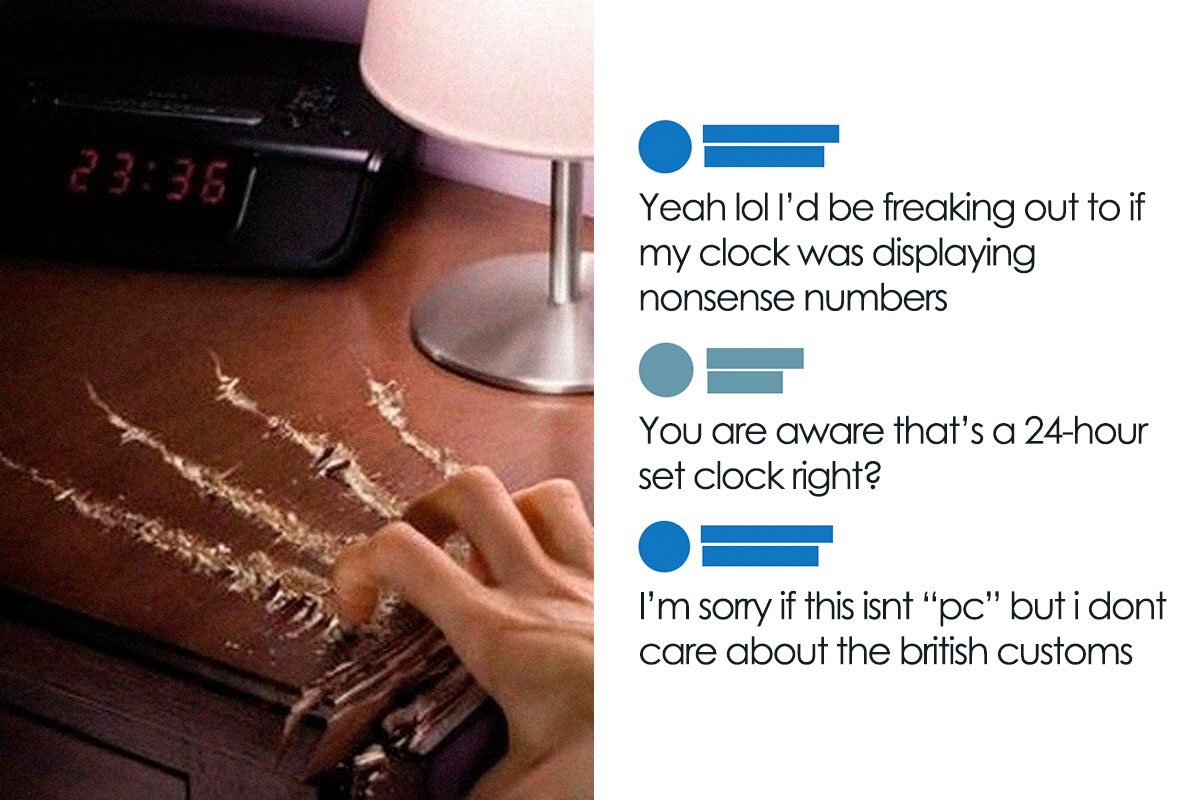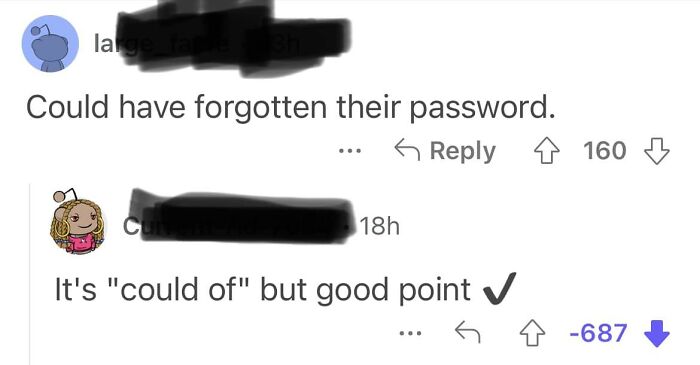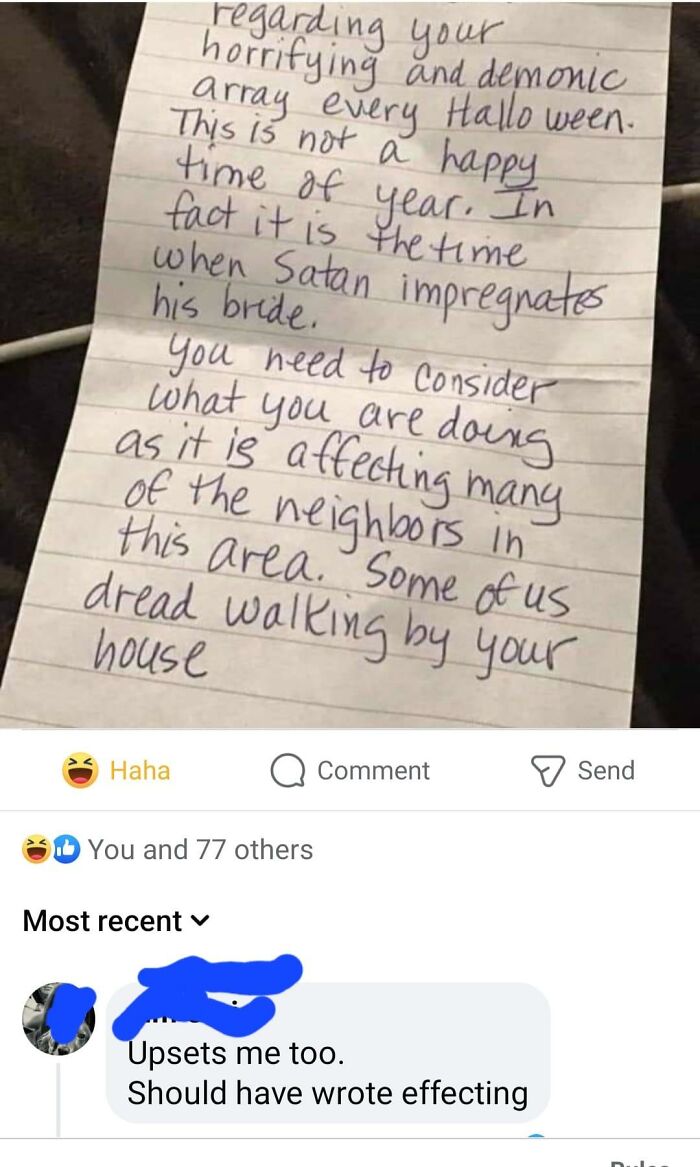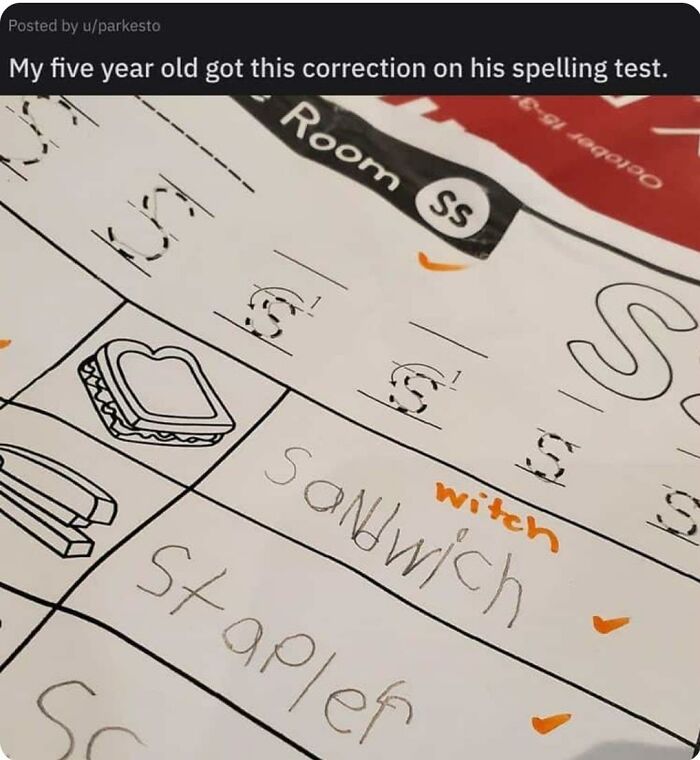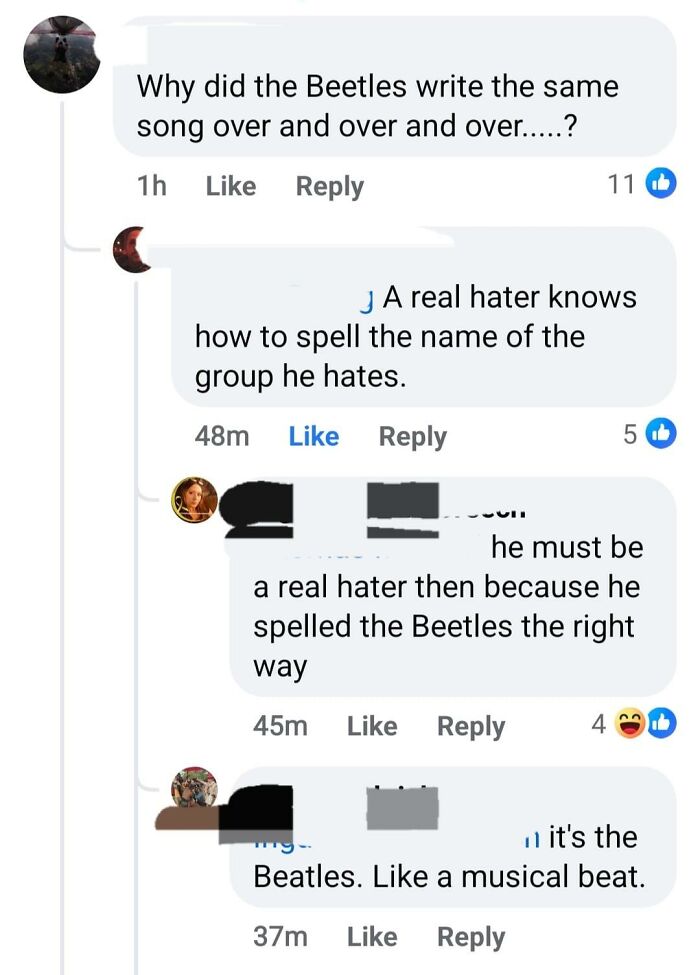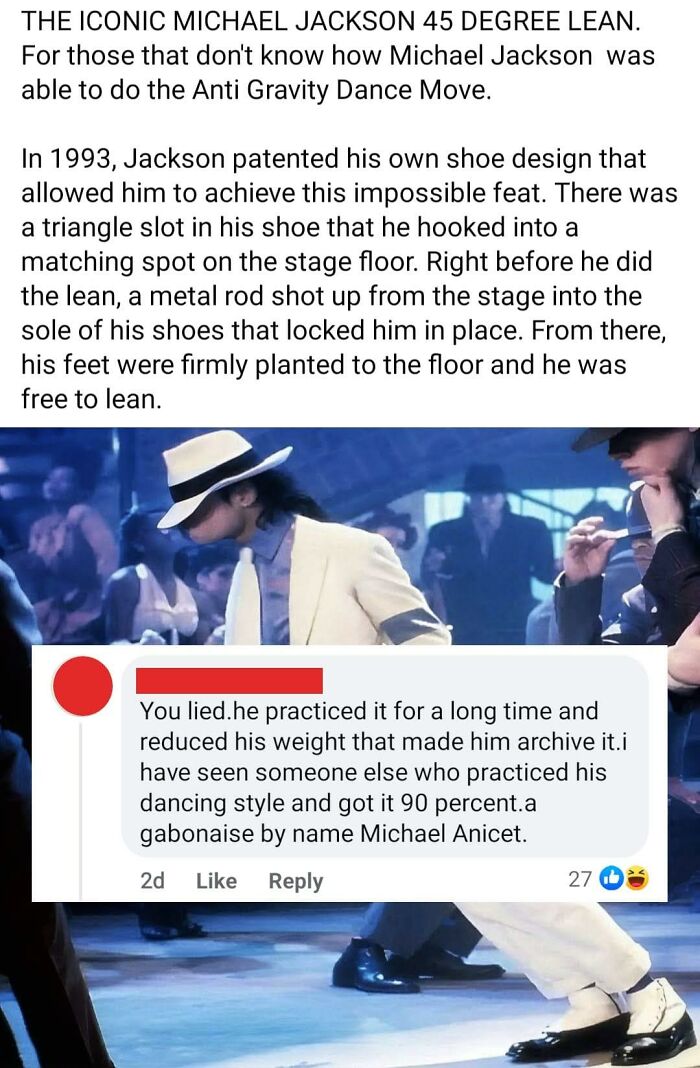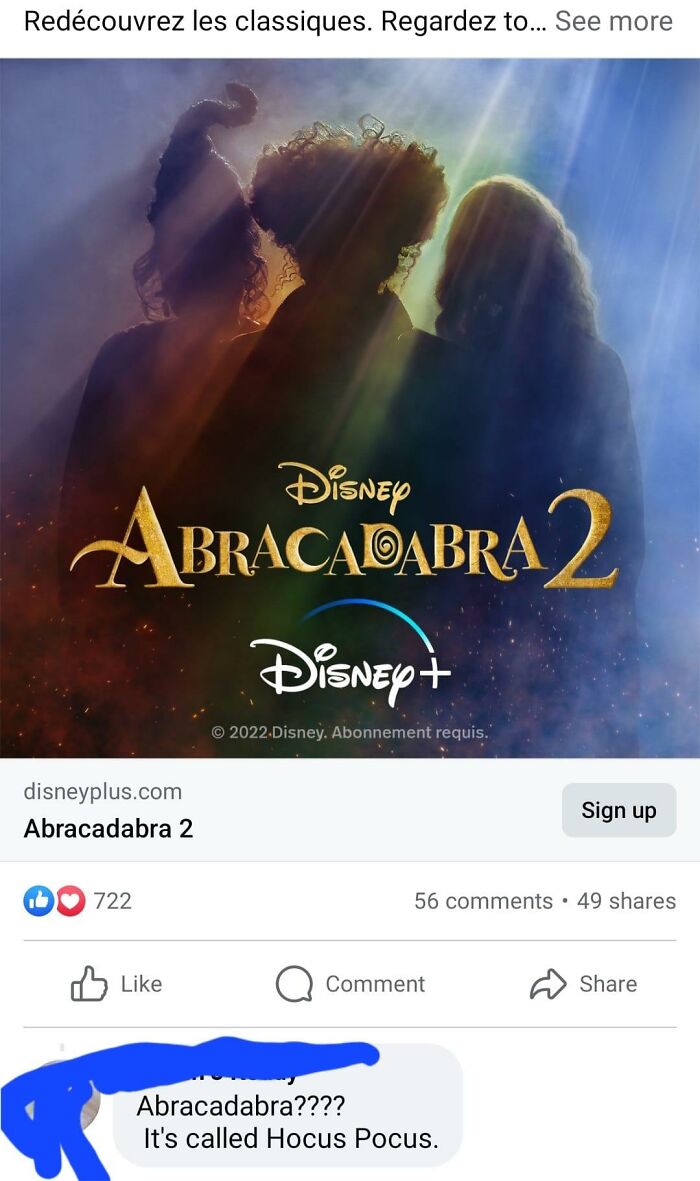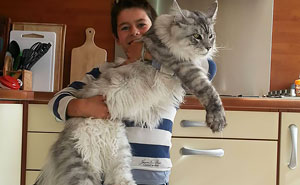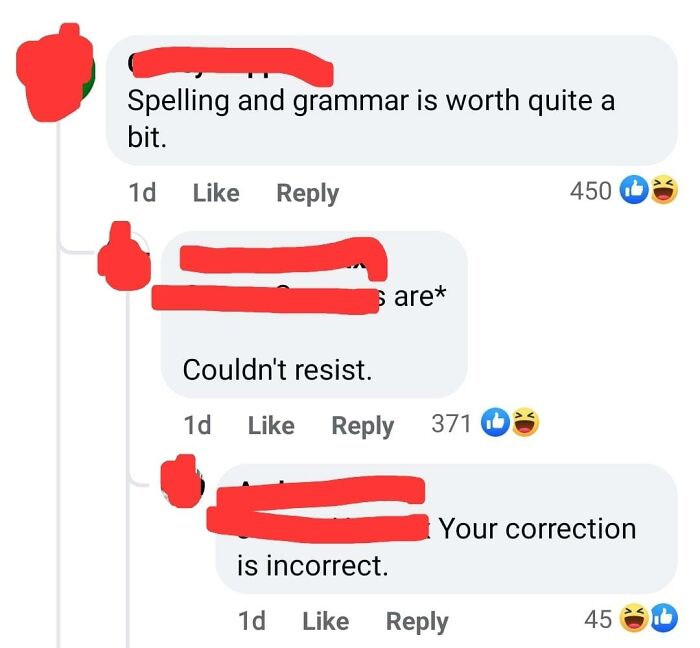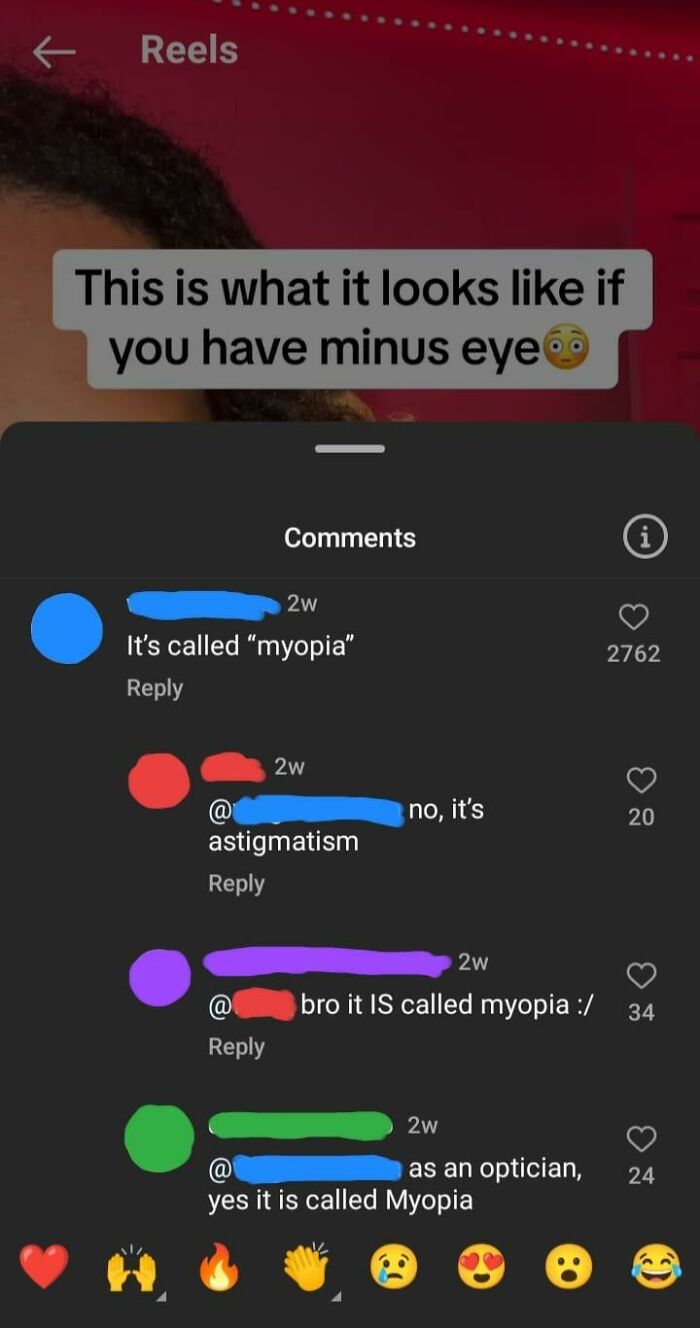Those who are insecure often project their supposed superiority in a variety of ways. One of the most popular ones is pointing out others' mistakes. However, sometimes the fact-checkers rely too much on their emotions and too little on the truth.
There's a Facebook group called 'People Incorrectly Correcting Other People' and it's full of humorous reminders that you need to be absolutely certain of what you're about to say when you're getting ready to bask someone, or else you're going to make a fool of yourself.
From folks who can't tell the time to grammar gurus stumbling on their own words, here are some of the most popular recent posts that were shared by the online community.
This post may include affiliate links.
Oh dear. Every day I have to remind myself some people really are that dumb
When people disagree on an issue, there are several possible routes they can take. Some might avoid it altogether (either by putting off the discussion or just agreeing with the other person in order to end the conversation). But, as you see in the pictures, it's not for everyone — others believe they need to actively resolve the matter.
In that case, they have a choice between being competitive or cooperative.
"Cooperative resolution means that people are seeking some kind of middle ground," explains Art Markman, Ph.D., and Annabel Irion Worsham Centennial Professor of Psychology and Marketing at the University of Texas at Austin. "Competitive resolution means that people are trying to convince the other person to change their belief."
This is one of those "bible is good enough for me" soccer moms, guaranteed.
Many factors lead people to take a cooperative or competitive stance when dealing with a disagreement. For instance, the personality characteristic of openness reflects how willing we are to consider new ideas, and people high in openness are more likely to be cooperative than those who are low in openness.
The characteristic of agreeableness reflects how much people want to get along with others — agreeable people are also more likely to seek a compromise than disagreeable people.
I see this mistake so often, it's like nails on a blackboard for me. I've never corrected anyone as I don't want to be one of "those" people!
"I could of forgotten my password", translation: "I could originating from forgotten my password" - sheer gibberish.
That assumes it's a lexical mistake, which it is not - it is a mistake that has its roots in pronunciation - a contracted 'have' and a weak form 'of' have identical pronunciation, so people who learned English firstly spoken secondly written may make this mistake when transcribing what they say. It's also primarily a written error, as in natural spoken English "could of" and "could've" are indistinguishable (of course there are some exceptions where the written error causes a feedback loop into someone's spoken English and they stress the 'of'). Non-natives rarely make this mistake as they learn English firstly/simultaneously written.
Load More Replies...This is a current pet peeve of mine. So many people are nearly illiterate. They hear "could've" and likely never read and so we have "could of". Drives me bonkers.
"I have forgotten my password" - makes sense. "I could have forgotten my password" - makes sense. "I could of forgotten my password" would be inextricably linked with the phrase " I of forgotten my password" - those DO NOT make sense.
I sound like my grandmother but are children learning anything at school these days?
OMG ; I'm sick of this recent trend " could of ", etc. Didn't people get taught grammar ? Could've been absent from class that day !
"Could of" is the stupid's phonetic rendition of the contraction "could 've". Anyone else to blame, but the relevant education system? All else are cheap excuses! (No, they are NOT "indistinguishable" in correct English.)
If I were to be that person, I would go to the school where I was supposed be taught that, and give my teacher a hard slap.
My children picked up "could have" from friends at school. Every time I heard it, they had to repeat "could have, could have ...." ten times. Now they're teenagers and I haven't heard "could of" for a couple of years.
It's hilarious that people think you "could" of...I mean...even if you would of, could you?
The shortening of 'could have' to 'could've', often morphs into 'could of'. A common mistake.
Markman also suggests a paper by Kimberly Rios, Kenneth DeMarree, and Johnathan Statzer in the July 2014 issue of Personality and Social Psychology Bulletin to better understand what affects our tendency to be cooperative or competitive.
Turns out, people's certainty about their beliefs can be broken down into two components: clarity and correctness. Clarity determines if we are sure about what we believe. Each of us has some beliefs that we hold deeply and others to which we are not as firmly attached. Correctness focuses on whether we think our belief is 'correct' in some broader cultural context or not.
The authors suggested that the more strongly people believe their attitude is correct, the more competitive they will be in their discussions with others. (Interestingly, they did not assume that clarity would be as strongly related to competitiveness.)
"Being certain of your attitude can affect whether you try to convince other people that you are right," Markman writes. "In particular, the more strongly you believe that your attitude is the right one, the more you will focus on convincing others."
"That also means that if you find yourself in conflict with others on a regular basis, you might want to evaluate whether you generally assume that your attitudes are the correct ones."
Manners mentor Maralee McKee finds it sad that sometimes, when people speak, their words seem more spit out than thought out.
"Stories abound, and it has happened to me, about being called out in person in front of family members, coworkers, friends, and anybody and everybody else for minor things, from incorrectly quoting a movie line, to saying something happened on a Tuesday when it occurred on a Wednesday, to getting the name wrong of the restaurant an incident occurred in while telling a great story," she says.
But even if you're skinny your weight is still distributed fairly evenly around your body
According to McKee, even if the 'correctors,' 'nit-pickers,' and 'accusers' are right, correcting others over small things is rarely called for, it seldom wins anyone friends, and on the rare occasion when it is called for, it's tricky to accomplish politely.
For more people incorrectly correcting other people, fire up our older publications on the Facebook group, called 50 People That Had More Courage Than Brains To Go Incorrectly Correcting Someone and 45 Painfully Cringe Moments When People Thought They Knew Better, But Embarrassed Themselves Instead.
Except we'd still have to do a leapyear but with four extra days.
Dumb fűck probably doesn't even know it's the symbol for the Euro.
Which is correct sulphur or sulfur? Sulfur has been the preferred spelling of the International Union of Pure and Applied Chemistry (IUPAC) since 1990, and is the default form employed by many scientific journals 1. The alternative spelling sulphur may still be found in common use in the UK and Commonwealth, especially by laypeople.Mar 15, 2019
four is germanic. Colour is latin. The "u" was artificially introduced to make consistency with french spelling (french descends from latin). Original old english for four was "feower".
I use these differently even though we supposedly use UK english here. I use mold for the fungus and mould for shaping-something (verb or noun). I do the same with disc/disk and program/programme. I use disc = a circle, disk = a computer disk; and program = verb, to make a computer do something; programme = series of in-person/person-attended events , e.g. wedding programme.
This one shouldn't be here. It's simply the difference between British English and American English. Both are correct ,it simply depends on which English you use.
“Spelling and Grammar” would be replaced by the pronoun they, meaning are is perfectly valid.
Note: this post originally had 70 images. It’s been shortened to the top 45 images based on user votes.
These people are walking among us, voting, and reproducing. Please excuse me while I go and find a little cave far,far away from these idiots.
It stopped getting funny after the first few. Idiocy is terrifying sometimes
One of the most confused pairs of words nowadays is "lie" and "lay". You lie in bed. A chicken lays eggs.
But "I lay in bed yesterday' is correct again, because the past tense of 'lie' is 'lay'.
Load More Replies...These people are walking among us, voting, and reproducing. Please excuse me while I go and find a little cave far,far away from these idiots.
It stopped getting funny after the first few. Idiocy is terrifying sometimes
One of the most confused pairs of words nowadays is "lie" and "lay". You lie in bed. A chicken lays eggs.
But "I lay in bed yesterday' is correct again, because the past tense of 'lie' is 'lay'.
Load More Replies...